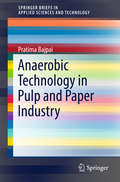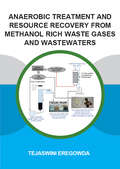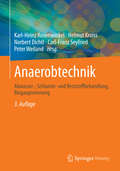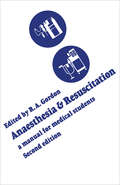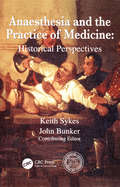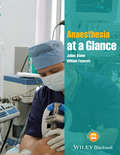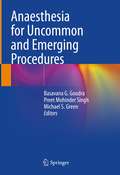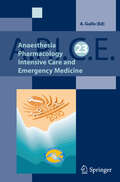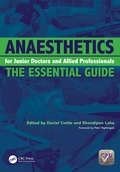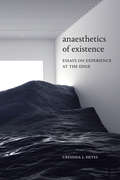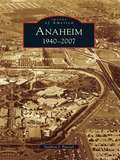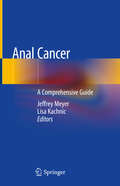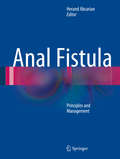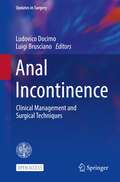- Table View
- List View
Anaerobic Oxidation of Methane Coupled to the Reduction of Different Sulfur Compounds as Electron Acceptors in Bioreactors (IHE Delft PhD Thesis Series)
by Chiara CassariniThis research investigated new approaches to control anaerobic methane oxidation coupled to sulfate reduction (AOM-SR) and enrich anaerobic methanotrophs (ANME) and sulfate reducing bacteria (SRB) with the purpose of designing a suitable bioreactor for AOM-SR at ambient pressure and temperature. The current knowledge about AOM and the microorganisms involved in AOM are discussed. The effect of different substrates and pressures was investigated on the ANME and SRB community adapted to the shallow marine Lake Grevelingen, the Netherlands. Further, microorganisms from the Alpha Mound (Spain) deep sediment were enriched with methane gas as substrate in biotrickling filters (BTF) at ambient conditions for 147-230 days of operation. The effect of alternative sulfur compounds (sulfate, thiosulfate and elemental sulfur) were studied and the microbial community was characterized. The highest AOM and sulfate reduction rates were obtained in the BTF fed with thiosulfate as the electron acceptor (~0.4 mmol l-1 day-1), but the highest number of ANME was visualized in the sulfate fed BTF (ANME-2 43% of the total visualized archaea). A BTF was proposed as a suitable bioreactor for the enrichment of ANME and SRB at ambient pressure and temperature which could be potentially used for future biotechnological applications.
Anaerobic Technology in Pulp and Paper Industry (SpringerBriefs in Applied Sciences and Technology)
by Pratima BajpaiThis book presents a state-of-the-art report on the treatment of pulp and paper industry effluents using anaerobic technology. It covers a comprehensive range of topics, including the basic reasons for anaerobic treatment, comparison between anaerobic and aerobic treatment, effluent types suitable for anaerobic treatment, design considerations for anaerobic treatment, anaerobic reactor configurations applied for treatment of pulp and paper industry effluents, present status of anaerobic treatment in pulp and paper industry, economic aspects, examples of full scale installations and future trends.
Anaerobic Treatment and Resource Recovery from Methanol Rich Waste Gases and Wastewaters (IHE Delft PhD Thesis Series)
by Tejaswini EregowdaMethanol is an important volatile organic compound (VOC) present in the gaseous and liquid effluents of process industries such as pulp and paper, paint manufacturing and petroleum refineries. An estimated 65% of the total methanol emission was from the Kraft mills of the pulp and paper industries. The effect of selenate, sulfate and thiosulfate on methanol utilization for volatile fatty acids (VFA) production was individually examined in batch systems. Gas-phase methanol removal along with thiosulfate reduction was carried out for 123 d in an anoxic BTF. To examine the gas-phase methanol removal along with selenate reduction, another anoxic biotrickling filter (BTF) was operated for 89 d under step and continuous selenate feeding conditions. For the study on liquid-phase methanol, acetogenesis of foul condensate (FC) obtained from a chemical pulping industry was tested in three upflow anaerobic sludge blanket (UASB) reactors operated at 22, 37 and 55 ºC for 51 d. The recovery of VFA was explored through adsorption studies using anion exchange resins in batch systems. The adsorption capacity of individual VFA on Amberlite IRA-67 and Dowex optipore L-493 was examined by fitting the experimental data to adsorption isotherms and kinetic models. A sequential batch process was tested to achieve selective separation of acetic acid from the VFA mixture.
Anaerobic Treatment of Mine Wastewater for the Removal of Selenate and its Co-Contaminants (IHE Delft PhD Thesis Series)
by Lea Chua TanSelenium (Se) pollution has led to several cases of severe aquatic ecosystem deterioration due to Se poisoning caused by bioaccumulation over time. However, the removal of selenate (SeO42-) from wastewater streams with co-contaminants has been largely considered as a black box in anaerobic biological systems using mixed consortia. This research aimed at addressing the effect of wastewater characteristics, i.e. co-contaminants such as nitrate (NO3-) and sulfate (SO42-), heavy metals and pH, on the biological reduction of SeO42- and evaluating process integration for Se-laden wastewater treatment with co-contaminants. This study demonstrated that the presence of co-contaminants can actually be beneficial for Se removal provided that the concentrations are carefully monitored and appropriate operating conditions and process configurations are used. The Se removal (total Se and SeO42-) efficiency increased by ~30% in the presence of NO3- and/or SO42- compared to systems with SeO42- alone. Additionally, an integrated process of an ion exchange (IX) column and bioreactors showed improved overall removal capacity for SO42- and total Se. The knowledge and information gained from this research can help in the advancement and application of biological processes, i.e. predicting of reactor performance, solving specific design or practical problems and implementing novel treatment techniques for Se-laden mine wastewater.
Anaerobic Waste-Wastewater Treatment and Biogas Plants: A Practical Handbook
by Joseph Chukwuemeka AkunnaThe book guides specialists and non-specialists from around the world on how or whether anaerobic processes can be part of solutions for the management of municipal and industrial solid, semi-solid, and liquid residues. The simple self-learning presentation style is designed to encourage deep understanding of the process principles, plant types and system configurations, performance capabilities, operational and maintenance requirements, post-treatment needs, and management options for coproducts without complex biochemical terminologies and equations. It describes key aerobic biological treatment processes used in conjunction with anaerobic biological treatment in feedstock pre-treatment and in post-treatment of by-products. Practical pre-treatment processes, techniques and operations are described alongside additional treatment techniques of biogas, digestates and treated effluents for various end use options. Effective applications in developing countries are also considered, enabling practitioners and plant operators to effectively apply technology in temperate and warm climatic conditions.
Anaerobtechnik: Abwasser-, Schlamm- und Reststoffbehandlung, Biogasgewinnung
by Karl-Heinz Rosenwinkel Helmut Kroiss Norbert Dichtl Carl-Franz Seyfried Peter WeilandIn dem Buch wird der neueste Stand anaerober Verfahren erl#65533;utert: zur Behandlung von industriellen wie kommunalen Abw#65533;ssern und Feststoffen sowie zur Verg#65533;rung von nachwachsenden Rohstoffen und Abf#65533;llen zur Energieerzeugung. Neben den Grundlagen liefert das Praktiker-Handbuch zahlreiche Anwendungsbeispiele. In der 3. Auflage werden die Verfahren der Biogaserzeugung ausf#65533;hrlicher behandelt, neu aufgenommen wurden anaerobe Verfahren der N#65533;hrstoffelimination und -r#65533;ckgewinnung sowie Beitr#65533;ge zu Emissionen von CO2-#65533;quivalenten aus anaeroben Verfahren.
Anaesthesia and Resuscitation: A manual for medical students (Second edition)
by Roderick A. GordonAs in most fields of medical practice many things in anaesthesia are done on an empirical basis: this speciality is dynamic and expanding, and today's dogma may become tomorrow's error. This introductory manual, now revised and updated in a second edition, was prepared by the Department of Anaesthesia in Canadian medical schools and provides the undergraduate medical student with an important foundation for wider knowledge in the realm of anaesthesiology. Contents include Anaesthesia in relation to surgery , Evaluation of the patient before anaesthesia, Preanaesthetic medication, General anaesthesia, Neuromuscular transmission and muscle relaxation, Regional anaesthesia, Care of the unconscious patient, Respiration and anaesthesia, Cardiovascular homeostasis in relation to anaesthesia and resuscitation, Fluid and electrolyte balance, Acid-base balance, Complications of anaesthesia, Postoperative problems and care, Obstetrical anaesthesia and resuscitation of the newborn, and Special considerations in paediatric anaesthesia.
Anaesthesia and the Practice of Medicine: Historical Perspectives
by Keith Sykes John P BunkerWritten by two anaesthetists, one British and one American, this unique book focuses on the transatlantic story of anaesthesia. The authors have both worked at the two hospitals where the first general anaesthetics for surgery were given in 1846, Massachusetts General Hospital in Boston, Massachusetts and University College Hospital, London. Each with more than fifty years' experience of working in anaesthesia, they combine their knowledge and expertise to offer a fresh outlook on the development of anaesthesia through the ages.This highly informative and intriguing text details the origins of anaesthesia, outlines the different techniques of anaesthesia and traces its progress with illuminating and enlightening commentaries. This is a fascinating book which considers the role key figures have played in developing anaesthesia including, Queen Victoria, William Morris, La Condamine, Bjorn Ibsen and Henry Beecher.Broken down into four sections, which are divided into easy-to-read chapters and filled with top quality photographs, this book makes compelling reading. It is recommended to all those interested in the history and development of medicine through the ages, and is of particular interest to anaesthetists. More than just the science of anaesthesia, this is the story about the people and personalities who have made anaesthesia what it is today.
Anaesthesia at a Glance
by William Fawcett Julian StoneAnaesthesia at a Glance is a brand new title that provides a concise and visually-orientated summary of a comprehensive lecture course in anaesthesia. Ideal for clinical undergraduate medical students and Foundation Programme doctors undertaking anaesthesia attachments, it gives a systematic, broad view of anaesthesia in various specialties, taking the reader through preparation, management and the pharmacology behind anaesthetic medicine.Anaesthesia at a Glance is supported by a companion website at www.ataglanceseries.com/anaesthesia containing interactive multiple-choice questions and answers together with a selection of interactive cases - perfect for study and revision.Whether you want to refresh your knowledge or need a thorough overview of the specialty, Anaesthesia at a Glance presents all the vital clinical information you need.
Anaesthesia for Uncommon and Emerging Procedures
by Basavana G. Goudra Preet Mohinder Singh Michael S. GreenThis book provides detailed and practical information for anesthesia providers worldwide who are challenged with providing anesthesia for both emerging and infrequently performed procedures. Concise and well-structured 42 chapters in this book provide accurate and up-to-date information that helps the reader to safely anesthetise patients presenting for a variety of procedures such as conjoined twin separation, pediatric heart and lung transplantation, pancreas and small intestine transplantation, endobariatric procedures, peroral endoscopic myotomy, jugular foramen tumors, robotic gynecological surgeries, proton beam therapy and many other complex surgeries and procedures.Anaesthesia for Uncommon and Emerging Procedures fills a unique void long felt by anesthesia providers. The book is a must for in every department or library as it provides handy reference even for providers engaged in providing anesthesia for such procedures on a regular basis. Anesthesiologists, CRNAs/AAs and those in in preoperative clinics such as hospitalists and APRN/PA providers will find this book to be an invaluable resource for optimizing outcomes in anesthesia.
Anaesthesia for Veterinary Nurses
by Liz WelshAnaesthesia for Veterinary Nurses has been written specifically for veterinary nurses by veterinary nurses and veterinary surgeons. Easy to read and understand, it provides detailed coverage of the physiological, pharmacological and physical aspects of anaesthesia. Fully updated and reflecting recent changes to veterinary nursing qualifications, this second edition is now also illustrated in colour. Sedation and anaesthesia are a crucial part of veterinary practice, and the protocols and methods involved are often complex and vary considerably from animal to animal. In addition to cats and dogs, Anaesthesia for Veterinary Nurses contains detailed sections on rabbits, rodents, birds, reptiles, and larger animals. Suitable for those with or without previous subject knowledge, this book is ideal for quick reference by veterinary nurses and technicians in practice, or for more substantial study by students. • Reflects recent changes to veterinary nursing qualifications, current terminology and drugs in use. • Includes chapters on small mammals, birds, reptiles, and large animals. • Now illustrated with colour photographs.
Anaesthesia in Remote Hospitals: A Guide for Anaesthesia Providers (Sustainable Development Goals Series)
by Daniela KietzmannThis book provides a concise and practical guide for Non-Physician Anaesthesia Providers (NPAPs) such as nurse anaesthetists and Non-Specialist Physicians working in remote settings. In many hospitals in low and even in some middle-income countries, nurse anaesthetists are working without the presence of a specialist anaesthesiologist at their hospital. During their training on the job or at one of the few schools of anaesthesia they have to act as improvising do-it-yourself-teachers for one another. Later in their professional life, NPAPs are often organising their continuous medical education themselves, trying to provide short presentations on topics between attending to patients. This book fills the need for a quick- to-read guide for the everyday work of NPAPs and Non-specialist physician anaesthesia providers, addressing challenges such as electricity failure, lack of technical support, drugs and materials, equipment and support of specialist anaesthesiologists. Anaesthesia in Remote Hospitals: A Guide for Anaesthesia Providers covers the most important fields of anaesthesia in a typical district or referral hospital in a place where resources are limited. It provides many useful tables with doses of drugs, sizes of airway equipment, infusion rate, examples of observation charts and anaesthesia records. Nurse Anaesthetists, Clinical Officers and Resident Physicians will find this book to be an essential guide to Anaesthesia within low resource and remote settings.
Anaesthesia on the Move (Medicine on the Move)
by Sally Keat Simon Bate Alexander Bown Sarah LanhamThe Medicine on the Move series provides fully flexible access to subjects across the curriculum in a unique combination of print and mobile formats ideal for the busy medical student and junior doctor. No matter what your learning style, whether you are studying a subject for the first time or revisiting it during exam preparation, Medicine on the Move will give you the support you need. This innovative print and app package will help you to connect with the topic of anaesthesia in preparation for exams and future clinical practice.By using this resource in print or as an app, you really will experience the opportunity to learn medicine on the move.
Anaesthesia, Pharmacology, Intensive Care and Emergency A.P.I.C.E.: Proceedings of the 23rd Annual Meeting - International Symposium on Critical Care Medicine
by Antonino GulloInnovation, training and research are the pillars that support a process deriving from basic science and multi-professional/multidisciplinary interventions. The APICE 2012 yearbook deals with several innovations for optimising prevention and management measures for the critically ill, by integrating diagnostic procedures with pharmacological and technological options. Peri- and postoperative managements as well as treatment of surgical infections and of pain, new and old artificial ventilation strategies are some of the most relevant topics the volume deal with in this new edition. The volume focuses also on the improvement standards and quality of care; on the expanding concept of clinical governance and professionalism and on the importance of ethical principles for establishing a process of patient-centered and evidence-based care.
Anaesthesia: Illustrated Clinical Cases (Illustrated Clinical Cases)
by Magnus Garrioch Bosseau MurrayContaining 220 challenging clinical cases and illustrated with superb, high-quality images, this book covers a wide range of anaesthesia-related questions and answers from straightforward cases through to more challenging presentations. It is an invaluable text for anaesthesia professionals in practice and in training, both for those doctors prepar
Anaesthetic and Perioperative Complications
by Jane Sturgess Kamen Valchanov Stephen T. WebbAnaesthetic and Perioperative Complications dissects the nature of complications and helps anaesthetists and anaesthetic practitioners understand, avoid and manage them efficiently. Leading experts combine the detailed clinical management of common and important anaesthetic and perioperative complications with discussion of the key philosophical, ethical and medico-legal issues that arise with assessing a medical complication. Initial chapters discuss how and why complications occur, the prevention of complications and risk management. The main body of the text reviews the clinical management of airway, respiratory, cardiovascular, neurological, psychological, endocrine, hepatic, renal and transfusion-related complications, as well as injury during anaesthesia, complications related to regional and obstetric anaesthesia, drug reactions, equipment malfunction and post-operative management of complications. Each chapter contains sample cases of complications and medical errors, giving clinical scenario, outcomes and recommendations for improved management. This is an important practical and clinical text for all anaesthetists and anaesthetic practitioners, both trained and trainees.
Anaesthetics for Junior Doctors and Allied Professionals: The Essential Guide
by Daniel Cottle Laha ShondiponArriving in the anaesthetic room for the first time can be a daunting experience. You will be closely supervised, but everything will seem very new. Surgery is a stressful life-event for the patient and your job as an anaesthetist is to make it as safe and as comfortable as you can whilst ensuring the best outcome possible. Anaesthesia is no longer the preserve of the medical anaesthetist. It increasingly features in undergraduate and postgraduate healthcare education, and many of the competencies required need to be attained quickly, in conjunction with new drugs and equipment. This guide provides practical and clinically relevant advice in easily understandable sections to give you confidence and prepare you for your days in theatre - without the complicated physiology, pharmacology and physics. It allows you to understand the most common drugs and provides a rationale for using them. It's the perfect quick, clinical reference for dealing with common problems and emergencies; ideal for everyday use. This book is invaluable for anaesthetists starting out in their career, but is also highly recommended for Foundation, ACCS, ICM trainees, medical students, operating department trainees and nurses. It also provides an excellent revision basis for Primary FRCA candidates. 'This book provides the basic background and ground rules for how anaesthetists work, how they approach a problem and how one can prepare for it. Some of the initial chapters could be usefully read by all surgeons, especially those in Foundation Training posts, and medical students considering an anaesthetic or intensive placement. The use of lists, key points and limited use of references help make the book easy to read, or dip into between cases, and keep it a manageable size whilst still providing a mine of information for the target audience.' From the Foreword by Peter Nightingale
Anaesthetics of Existence: Essays on Experience at the Edge
by Cressida J. Heyes“Experience” is a thoroughly political category, a social and historical product not authored by any individual. At the same time, “the personal is political,” and one's own lived experience is an important epistemic resource. In Anaesthetics of Existence Cressida J. Heyes reconciles these two positions, drawing on examples of things that happen to us but are nonetheless excluded from experience. If for Foucault an “aesthetics of existence” was a project of making one's life a work of art, Heyes's “anaesthetics of existence” describes antiprojects that are tacitly excluded from life—but should be brought back in. Drawing on critical phenomenology, genealogy, and feminist theory, Heyes shows how and why experience has edges, and she analyzes phenomena that press against those edges. Essays on sexual violence against unconscious victims, the temporality of drug use, and childbirth as a limit-experience build a politics of experience while showcasing Heyes's much-needed new philosophical method.
Anagene, Inc.
by Robert S. Kaplan Christina DarwallAn entrepreneurial, publicly traded biotech company has begun production and sales of its core product--cartridges that permit DNA samples to be analyzed on a microchip. In the early quarters, sales are difficult to forecast and the company has experienced fluctuating production volumes and unpredictable gross margins, which has upset the board of directors. The finance staff investigates whether to adopt a new costing approach based on capacity. With large amounts of unused capacity, the decision of how to apply capacity costs is critical to the company's management and its reporting strategy with analysts.
Anaheim: 1940-2007
by Stephen J. FaesselAfter the developments that the World War II era brought to the small agricultural community of Anaheim, the major transformation arrived in 1955. Anaheim changed forever from a sleepy and proud little town into the center for entertainment and tourism in Southern California with the arrival of Disneyland. Other national and regional businesses and franchises arrived in and around this Orange County anchor city--including the California Angels baseball club, the Anaheim Convention Center, and such aerospace giants as Boeing and Rockwell International--and Anaheim grew exponentially. This collection of more than 200 vintage and contemporary images depict the results of Anaheim's far-sighted elected and business leaders, who nurtured the city from its agrarian roots and made it into one of the nation's fastest growing cities in the 1960s.
Anal Cancer: A Comprehensive Guide
by Jeffrey Meyer Lisa KachnicThis book is a comprehensive overview of the epidemiology, pathogenesis, and treatment options available for anal cancer. Anal cancer is a relatively rare disease, but one increasing in incidence. Strides have been made in developing treatment paradigms through clinical trials, and proper management requires multidisciplinary interaction between radiation oncologists, surgeons, and medical oncologists as well as other physicians, nurses, and other medical professionals. The book thus covers all aspects of the disease to give clinicians and their teams the information necessary to develop a treatment program that focuses on improved patient outcomes. Chapters cover evaluation of the patient and cancer staging, current standard treatments, epidemiology, pathogenesis, issues involved in survivorship, and ongoing and future avenues of research into disease biology and novel treatments. This book is an ideal resource for clinicians involved in the care of patients with anal cancer.
Anal Fissure: Symptoms, Diagnosis and Therapies
by Volker Wienert Franz Raulf Horst MlitzThis highly informative monograph offers a comprehensive and interdisciplinary reference guide for the management and treatment of the whole spectrum of painful tears in the anus and anal canal. Based upon a systematic review of all relevant papers on the topic since 1865, it addresses primary, acute and chronic anal fissures - providing a new definition of the last form - and secondary anal fissures in detail, particularly their medical history, etiology, signs and symptoms, medical findings, therapy and its evaluation, and differential diagnosis. The book also covers all available evidence-based therapeutic strategies. As such, it will appeal to a wide readership, from proctologists and surgeons to gynecologists, urologists, dermatologists and gastroenterologists.
Anal Fistula and Abscess (Coloproctology)
by Carlo Ratto Angelo Parello Francesco Litta Veronica De Simone Paola CampennìThis volume comprehensively describes the anatomy, pathophysiology, diagnostics, and modalities of treatment of one of the most complex and debated clinical conditions in coloproctology: anal fistulas and abscesses. It also debates current controversies and presents the best approaches based on the authors’ clinical expertise. Providing an in-depth understanding of the anal canal anatomy and surrounding area, it enables readers to manage anal sepsis and avoid excessive damage, in particular to the anal sphincters. Further, the book presents insights into the pathophysiological processes (in cryptoglandular and Crohn’s disease) causing abscess and fistula, which have a significant impact on the management of these conditions. It also discusses diagnostic assessments crucial for selecting the optimal surgical technique and offers guidance on the timing. Lastly, it assesses the pros and contras of the various surgical procedures, evaluating the possible outcome in terms of both therapeutic success and detrimental effects on the anorectal functions. As such it is a valuable resource for all physicians involved in the management of anal fistulas and abscesses (coloproctologists, general surgeons, gastroenterologists, radiologists).
Anal Fistula: Principles and Management
by Herand AbcarianAnal Fistula: Principles and Management provides a comprehensive and state of the art review of major issues specific and related to the treatment of anal fistulas. An important section of the book covers the large number of alternative procedures which have been developed in the last two decades. Needless to say, none of these procedures have been uniformly successful, otherwise there would be no need for all the different operations. The book addresses each alternative procedure, discusses the benefits of each procedure, includes the most up-to-date results. Other important chapters cover the causes and failure of treatment and operations for fistulas. Also included is a Cochrane Review of all available randomized controlled trials with levels of evidence culled from the literature. Written by specialists in their respective fields, Anal Fistula: Principles and Management fills a void in available texts on a subject matter very commonly encountered by surgeons, physicians and specialists.
Anal Incontinence: Clinical Management and Surgical Techniques (Updates in Surgery)
by Ludovico Docimo Luigi BruscianoThis open access book describes the latest advances in the anal incontinence diagnostic and therapeutic processes. Anal incontinence is a devastating condition heavily impacting on the patients’ lives. Those suffering from this disorder are generally very embarrassed and reluctant to undergo an appropriate clinical evaluation, thus becoming more isolated and worsening the quality of their life. Luckily, nowadays a wide range of treatments is available to improve this oppressive condition; however, the recognition of the related pathophysiological alterations is mandatory to grant its successful management. This volume will help the surgeons community to keep abreast of developments in diagnostics and treatment of this impairing condition. and will provide all health professionals with the appropriate tools to face this impairing condition.

